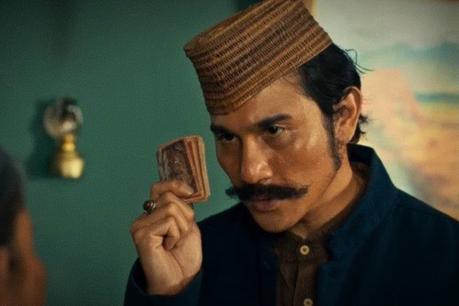Hailed by many as one of the finest Indonesian cult classics, Tindra Rengat’s Bayi Ajaib (1982) has inarguably traumatized generations of viewers in its native country and beyond. Combining The Omen-esque tropes with religious influence and pitch-black comedy, the oddball horror has an array of harrowing imagery (“reversed” pregnancy and gramp-looking baby among others) that might look campy, but haunting long after the credit rolls. This kind of shock factors is what Falcon Black (a subsidiary of Falcon Pictures) tries to re-emulate in their first production – a glitzy remake of Bayi Ajaib.
Same Old Baby, Same Ol’ Story
Rako Prijanto, at the helm in his first foray into horror territory, opts for visual upgrades to complement slight patch-ups in the narrative to make it more appealing to modern audiences. The plot is more or less a verbatim copy with some deliberate to revise ambiguity and choppiness of the source material. This is an intriguing creative choice – knowing that Falcon is in the middle of remake streaks (Miracle in Cell No. 7 and Perfect Strangers in the recent period; The Invisible Guest to come) that often play it too safe. At this point, calling it a remake even sounds way literal. Therefore, calling it a modernization might make more sense.

The plot still shuffles between a ploy to gain control of a village and a series of terror involving a demon-possessed kid. Two pivotal figures from the original film still take the center-stage. Kosim (Vino G. Bastian, Wiro Sableng) is running for electoral campaign – facing a tough competition from Soleh (Teuku Rifnu Wikana). Meanwhile, the former opposition, Dorman (Adipati Dolken), is now plotting more on the background – making Kosim’s newborn a vessel for a sinister Portuguese ghoul. All the while, the titular kid wreaks havoc every now and then – murdering people and terrorizing the village. There’s no twist, no write-off; just mayhem – pure mayhem.
Prosthetic Remake
If a horror film is a house of terror, what Bayi Ajaib (2023) offers is a cosmetic refurbishment to the whole theme park. It has more gallons of blood, more broken bones, more prosthetic make-ups for more hideous creatures, and more CGI effects as a bonus. Furthermore, this modernization has all the harrowing imagery from the source material unexceptionally and even goes as long as recreating every single iconic scenes with enhanced looks. However, all these attempts are pale in comparison to the lo-fi terror the original film effortlessly exude.

This goes to show that horror is a gnarly craft. What makes the terror in the 1982 film endure the test of time is how it revels the build-up to the spectacle and lets the shocking elements linger for awhile. It was never about the out-of-place prosthetic mask or the amount of fake blood spilled. Yet, it’s about catching viewers off-guard with a sudden sense of dread that stays put. Unfortunately, that’s not the case with this new version. Having all the shocking factors stripped off, Bayi Ajaib would need to rely on the craft of its own spectacles (which regrettably are scene-per-scene iterations of the original); but, the execution often seems sluggish and hasty. It’s as if the goal is to immediately flaunt their own version of the same events for comparisons.
At least, this modernization adopts the unintentional campiness – albeit in a different department. Both main characters’ rendition of the evil and less-evil battle feels more alive with a conflict that might have been influenced by wuxia films. But if you’ve seen anything glitters in Bayi Ajaib (2023), that only occurs at the face value.
6.8 Bayi Ajaib | January 19, 2023 (Indonesia) Director: Rako PrijantoWriter: Alim SudioStars: Vino G. Bastian, Adipati Dolken, Desy Ratnasari Summary: Countries: IndonesiaLanguages: Indonesian Source: imdb.comDisclaimer: This plugin has been coded to automatically quote data from imdb.com. Not available for any other purpose. All showing data have a link to imdb.com. The user is responsible for any other use or change codes.